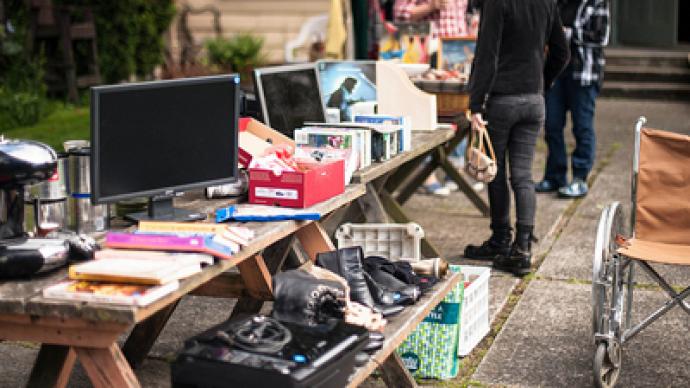Copyrighters take legality of second-hand sales to Supreme Court

A little-known case may result in a ban on reselling any product made overseas without US copyright holders taking a share of the profits. A single ruling by the Supreme Court could make all secondary market sites – including garage sales – illegal.
Kirtsaeng v. John Wiley & Sons will center on whether or not an individual can buy copyrighted material outside the United States, then resell it inside the US. The first-sale doctrine, established 1908, permits individuals to sell copyrighted products to others. According to the doctrine, the copyright holder only has control over the first sale. But for products manufactured abroad – which include almost all popular electronics, including those Chinese-made gadgets consumers are so used to swapping annually – this law is being challenged.The trial, which begins October 29, follows a Thai student at Cornell University's choice to buy his textbooks abroad. Noticing that the books, required for class, were cheaper in Thailand, Supap Kirtsaeng had his relatives gather and mail them to him. Eventually, the graduate student began selling those books online at a profit.The textbooks were legally manufactured in Thailand and sold there at a much lower price. Still, the publisher sued Kirtsaeng in an attempt to stop the sale of the books – and make him pay $600,000 in damages. In order for the publisher to win the case, the court would have to rule to ban the resale of internationally manufactured products.But if the Supreme Court chooses to do so, it would apply to anything that has a Made in China, Japan or Europe sticker on it – causing problems for businesses like pawnshops, the Salvation Army, eBay, Craigslist, and other resale-based organizations. Many garage sales would likely break the law and individuals could face hefty fines for simply selling an old gadget to a friend.“It means that it’s harder for consumers to buy used products and harder for them to sell them,” Georgetown University Law Center professor Jonathan Band told MarketWatch. “This has huge consumer impact on all consumer groups.”Selling anything produced overseas, including CDs and DVDs, jewelry, electronics, books or artwork, would only be allowed if the seller pays the copyright holder a portion of the sale.Such a ban would prove especially troublesome for websites like Craigslist and eBay, which allow people to buy and sell their belongings online.“It would be absurd to say anything manufactured abroad can’t be bought or sold here,” Marvin Ammori, a First Amendment lawyer, told MarketWatch.In opposition to the potential change in copyright law, eBay has launched a movement to defend the first-sale doctrine. The online auctioneer has launched “eBay Main Street” – a website dedicated to mobilizing its merchants.“It is possible that an extreme application of US copyright law might enable manufacturers to force retailers and consumers to first have to obtain permission from the manufacturer before reselling or even donating goods manufactured overseas,” the newly launched website states. “This rule could affect most of the goods we use every day, from books to cell phones.”A coalition group called the Citizens for Ownership Rights (CFOR) has created a petition to express opposition against the change. “We, the undersigned, believe that we should truly own the things that we buy,” it reads.With a goal of collecting 100,000 signatures, the CFOR plans to send the petition to the US president.














